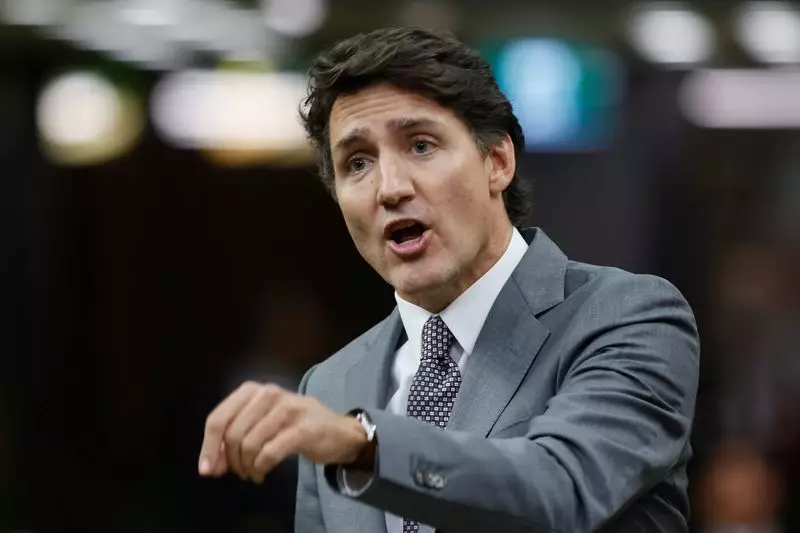In the ever-evolving landscape of Canadian politics, Prime Minister Justin Trudeau’s Liberal Party finds itself at a precarious juncture. With recent polling data indicating a significant decline in public support, the impending special election in the Montreal constituency of LaSalle—Emard—Verdun represents more than a mere contest for a parliamentary seat. It could very well signal a pivotal moment for Trudeau, whose leadership faces increasing scrutiny as the party grapples with dwindling popularity and calls for change.
The Significance of a Special Election
The importance of the LaSalle—Emard—Verdun election cannot be overstated. Traditionally viewed as a Liberal stronghold, the seat is now a battleground, reflecting a growing discontent among constituents and a potential shift in the political tide. Following the resignation of a prominent Liberal legislator, voters are being presented with an opportunity to express their dissatisfaction with the status quo. This election emerges as a litmus test for Trudeau’s ability to maintain control over a party that appears to be losing its grip in the face of fierce competition from the opposition.
Recent polls illustrate the fierce competition among the key players: the Liberals, the Conservatives headed by Pierre Poilievre, and the separatist Bloc Quebecois. The races are neck and neck, obscuring the once-clear path for the Liberals in this district. If Trudeau’s party fails to secure a victory, it will undoubtedly intensify the calls for new leadership and strategies as both legislators and constituents alike express their concerns with his effectiveness and vision.
As Trudeau heads into this critical election, he must navigate an increasingly disenchanted electorate. Many Canadians cite the soaring cost of living and a housing crisis as significant factors contributing to their frustration. Even within the ranks of the Liberal Party, dissenting voices are emerging. Lawmaker Alexandra Mendes has openly stated the discontent of her constituents, highlighting an erosion of support that could have lasting implications for Trudeau.
Public sentiment suggests that beleaguered Canadians are exhausting their patience as they grapple with economic pressures. According to Trudeau, voters are likely driven by anger over financial concerns; however, analyses indicate that surface-level acknowledgment may not suffice in addressing the root issues causing such widespread discontent. If the Liberals fail to address these concerns adequately, the party risks further alienation from the very individuals they aim to represent.
Amidst these challenges, the polling landscape suggests a troubling prospect for the Liberals—perilous declines that grant the opposition Coalition an opportunity to capitalize. Recent surveys have put the Conservatives at a staggering 45% support, while the Liberals linger at a distant 25%. This alarming trend reflects not only Trudeau’s declining popularity but also a broader shift in the Canadian electorate’s priorities and allegiances.
Trudeau’s strategy to shift blame onto the Conservative Party for their alignment with ideologies often equated with America’s far-right endeavors may lack the resonance his party desperately needs. The conventional political weaponry aimed at depicting Poilievre negatively, labeling him a supporter of the “Make America Great Again” movement, may resonate less effectively with a populace increasingly focused on their own economic realities.
Furthermore, the potential loss of LaSalle—Emard—Verdun could serve as an ominous signal for the upcoming federal elections. Having previously enjoyed a comfortable lead—43% in the 2021 general election—such a fall from grace could call into question Trudeau’s vision, giving rise to speculation about his ability to lead the party into the next election cycle.
As voting day approaches, the chatter surrounding Trudeau’s leadership is intensifying. His assertion that he intends to lead the party through the next election cycle may be met with skepticism if the results from LaSalle—Emard—Verdun emerge unfavorably. The pressure mounts as internal divisions grow, and optics become imperative for the Liberals moving forward.
This special election ultimately represents more than just a seat; it symbolizes a potential shift in Canadian politics. With rising tensions, economic concerns at the forefront, and a restless electorate, the Trudeau government must adopt effective strategies to rally support and demonstrate that they offer viable solutions to the challenges facing Canadians. The outcome will reverberate far beyond Montreal and could define Trudeau’s legacy as he confronts the possibility of an unexpected political transition.

